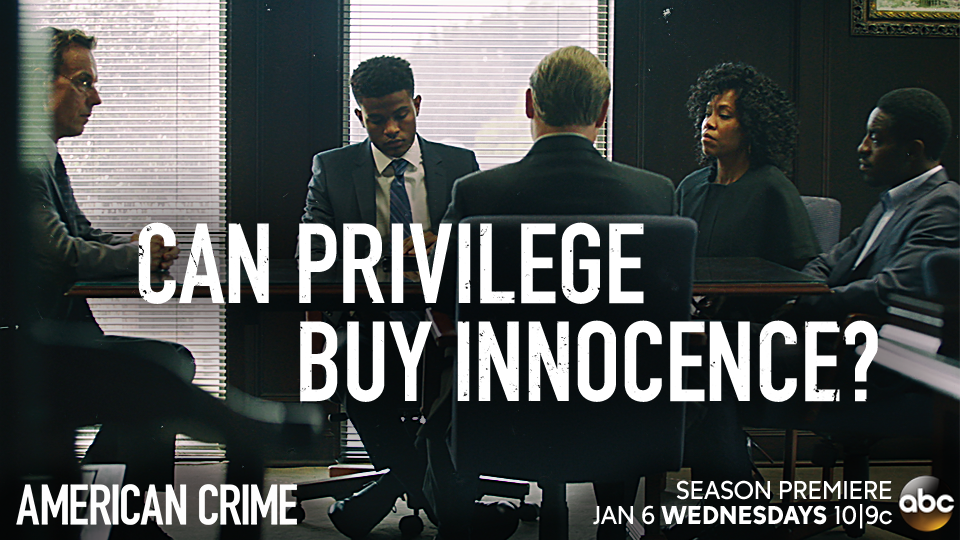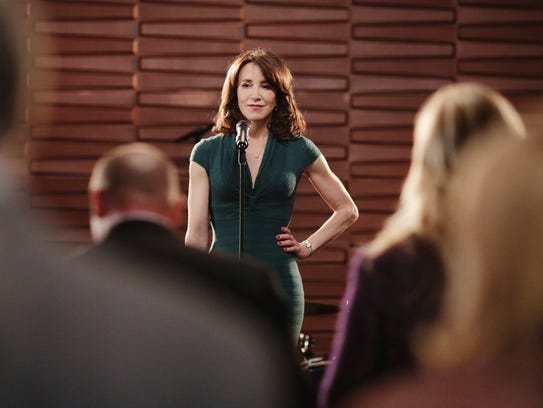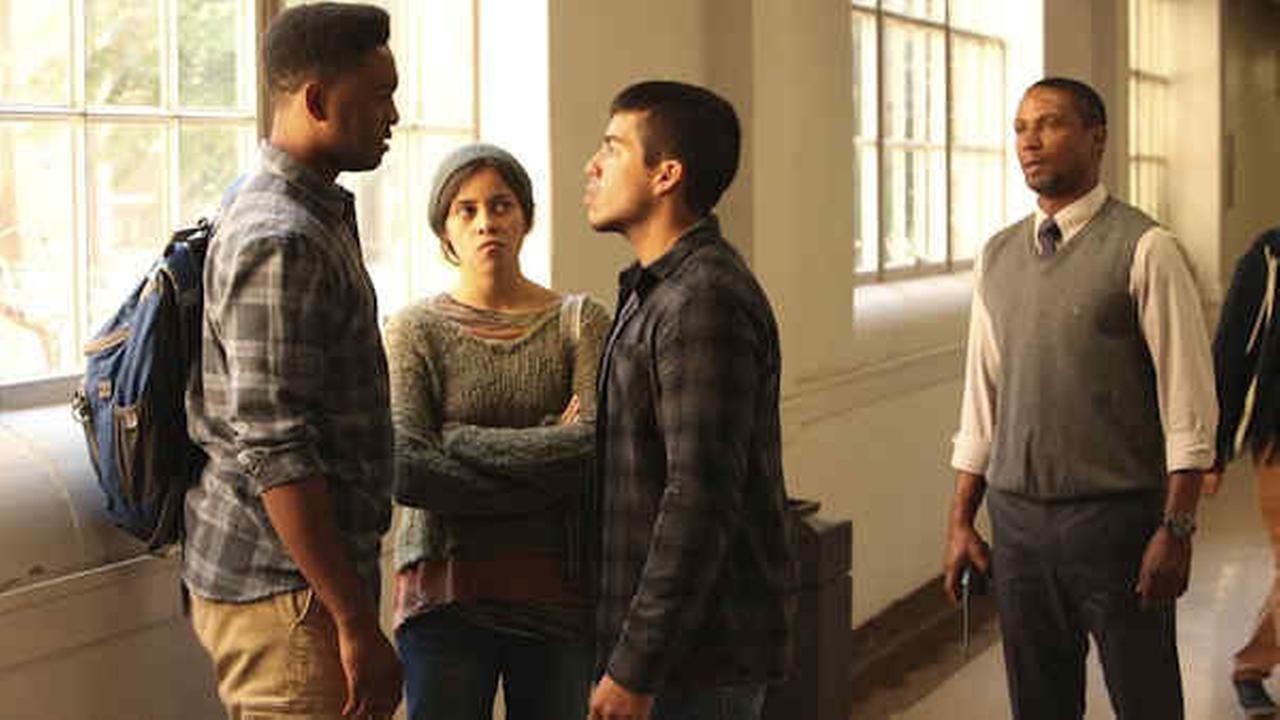It’s fair to say that my usual television habits aren’t
exactly light-hearted. I loved Breaking
Bad, but generally saw it more as a surrealist family drama. So understand
that when I say that American Crime
is tense, I mean it’s, like, REALLY tense. This is probably the most
uncomfortable show on television. Counting the Republican Debates. If you can get yourself comfortable with being
a little uncomfortable, however, it’s one of the few shows that I’ve seen where
I continually think to myself, “How the hell is this show on television?”
 |
| So, something light and effervescent tonight then? |
Before I go any further, I should mention that American Crime is not to be confused
with American Crime Story: The People vs.
O.J. Simpson. The latter is the latest offering from Ryan Murphy and
company, capitalizing on the success of American
Horror Story by launching a new anthology franchise that will explore real
American history. American Crime is
also an anthology series, however this is from writer John Ridley who is most
known as the writer of 12 Years a Slave.
As an anthology series, American Crime changes its story each season though retains much of
the same cast. The story this season revolved around an elite private high
school in Indianapolis and the fallout that occurs at that school and amongst
the students, teachers, parents, and community members when it comes out that a
student reports the he was raped at a party hosted by the school’s powerhouse
basketball team. That set-up alone should tell you most of what you need to
know about all the places that this show is unafraid to go: the simmering
racial tension that exists in American cities, overt and covert homophobia in a
post-Obergefell country, what politicians used to call “class warfare”, and the
morally grey area that school administrators inhabit in trying to provide an
education in a time when funding is low or non-existent.
American Crime
is unflinching in looking at each of these issues. It’s also a testament to how
well put together the series is that it never feels overstuffed despite all the
issues on its plate. That’s largely because it correctly understands that the
uniting strand behind all of these things is a collective fear of “the other”,
the person that is different from us. As such, all the racism, homophobia,
class tensions, privilege, and cutthroat business actions are accurately interpreted
as symptoms of the same ugly disease. What
makes it good television is that the characters are so completely watchable that
viewers are far more likely to get wrapped up in the story than feel like they’re
attending a political rally.
 |
| This scene actually passes for almost "playful" relative to some of the others... |
So what’s it actually about? The action mostly revolves
around an elite private school headed by Leslie Graham (Felicity Huffman) and
attended largely by the children of Indianapolis’s upper class families. Working class mother Anne Blaine (Lili
Taylor) is an exception, sacrificing all she can to afford the tuition for her
17-year-old son Tyler (Connor Jessup), who previously attended one of the city’s
rougher public schools. The story begins when Anne is informed by Leslie that
Tyler is set to be expelled from the school after lurid photos showing him
drunk and in various stages of undress have surfaced on the internet, a direct
violation of the school’s code of conduct. Tyler confesses to his mother that
the photos are genuine, however that he was, in fact, drugged and raped by
another student while attending a party hosted by the co-captains of the school’s
massively successful Basketball team.
Tyler’s claim is the catalyst for significant unrest at
the school, currently in the midst of a multi-million dollar fundraising effort
that Leslie hopes will catapult her to an even loftier position than
Headmaster. At the same time, it shakes the confidence of the school’s
basketball coach, played by Timothy Hutton, as he must face uncomfortable
questions about the behavior of his players, including whether or not one of
them is truly guilty of the crime and if so what that means. Caught up in all
of this is the LaCroix family, headed by matriarch Terri, played by Regina
King. Terri’s son, Kevin (Trevor Jackson) is one of the two co-captains and
Terri worries that these allegations will derail her carefully planned future
for her child. As one of the wealthy, she can afford to hire representation to
protect Kevin’s interests, even if that means causing harm to victim Tyler or
to the other student implicated directly in Tyler’s claims, co-captain Eric
(Joey Pollari).
| Safe to assume "have conversation about not getting involved in a rape charge" was not initially in her work plan. |
Terri is a mass of contradictions and Regina King plays
every one of them beautifully; she’s the driven perfectionist career woman who
wants to play the boys’ game but is intensely aware of what it means to be an African
American woman in that world. She is both controlling and patronizing of her
son and at the same time his biggest champion and a doting mother. She
represents the curious intersection of being one of the sole minority families
at an elite upper class predominately white school and at the same time being
one of the wealthiest, affording her son access to the kind of privilege that
other characters can’t even dream of. Seeing Regina King walk the fine line of
each of these near-contradictions every episode is one of the joys of watching
the show.
Likewise, watching Felicity Huffman as Headmaster Leslie
Graham is like watching a Venus flytrap getting ready to spring. Leslie is utterly
composed and in control, exuding concern about her students while managing the
political and administrative duties of her school. All that control belies her
ruthlessness, however, as we quickly see when trouble descends and Leslie
manipulates, maneuvers, and manages problems away, always with a level voice
and the kind of platitudes about leadership and responsibility that have all
the genuine emotion of a Successories poster. Her chief concern lies with
preserving the school and her record as an administrator, though she’s so darn
sensible sounding, even when she explains to a grieving mother that because the
mother signed a piece of paper while emotional, the school has no obligation to
safeguard the mother’s damaged child. She isn’t cold, per se; she’s tactical.
 |
| "Yes. I am fantastic, aren't I?" |
What makes the show particularly uncomfortable, aside
from the subject matter generally, is watching how each of these characters
from their varied perspectives approach the issue. Race is front and center,
though handled without the easy shorthand of poor-black-rich-white
characterization that many stories fall back on. A significant subplot revolves
around the actions at one of the public schools after three Latino students
attack a black student for groping a girl. The school’s overtaxed principal,
played by Elvis Nolasco, suspends the three Latino students for their frankly
violent assault leading to outrage by the Latino community who point out that
the black student went unpunished despite attacking a girl. The principal, a
black man, must examine how his approach is not only intended but viewed by
communities that are already racially divided.
 |
| Ugh. Simmering racial tensions in high school. Worse than math homework, amirite? |
Homophobia is also an evident theme and, with one
particularly terrifying exception, is addressed mostly in the kind of “er, not
that there’s anything wrong with that” wishy-washiness that shows that a fair
number of people actually believe that there is, in fact, something very wrong
with that but just recognize that they can’t say such things. (There are likely
a lot of Trump voters in this story.) Tyler’s mother and his girlfriend struggle
to find the middle ground between being supportive of him and deeply
uncomfortable with his lie-of-omission. Tyler’s sexual orientation becomes a
subject of debate as he’s called to justify his own feelings because they have
bearing on a criminal case. His own family, one that is deeply loving of him,
shows their own flaws when Tyler recounts how one of the surrogate parents who
helped raise him, a man who still clearly cares for him as a son, unthinkingly
continues to throw words like “faggot” around as insults.
And then there’s the issue that makes everyone uncomfortable: Tyler’s rape.
Anyone who has spent any significant time around the issue of rape will
recognize all the hallmarks of familiarity here. As the series progresses, the
rape takes on a grayer hue reflecting the reality that most rapes aren’t
committed by strangers in alleys but by someone we know. When it comes out that
Tyler went to the party willingly and, in fact, with the intention of having
clandestine sex with his attacker, not only does Tyler have to come clean about
his sexual orientation but also the very nature of it and the exploratory
nature of sex itself. When his mother angrily demands to know if he intended to
have sex, his response is a weak but ultimately exactly correct one: “I didn’t
go there intended to be violated.” We logically know that we’re not supposed to
blame the victim, but the myriad of ways in which we still manage to are fully
on display here, particularly given that the victim is male.
| Predictable MRA bullshit misinterpretations to being in 3...2... |
When you’re dealing with so many heady issues, it’s
inevitable that some of the presentation is going to get a little mucked up.
Viewers may find it unsettling that the victim of rape here is male,
particularly given that the number of male rape victims, while certainly in
existence, is far outweighed by the number of females. It’s not that hard to
draw the conclusion that the rape is given its importance only once it becomes
something that happens to men. And while there is a female victim of sexual
violence among the show’s ensemble cast, her story is given nowhere near the
heft or screen time as Tyler’s.
Likewise, the show’s one prominent African American
family is wealthy and powerful, particularly in contrast to the other
predominantly working class white families. At several times in the season,
different white characters seek out Terri LaCroix and her husband to ask for
assistance and are unilaterally rebuffed every time. It’s not terribly hard to
see a racist form of wish-fulfillment embodied here whereby a viewer, again
likely also a Trump voter, would interpret this as yet more evidence of how
black people have gotten the upper hand over white people and white people are punished
unfairly. While the show clearly takes pains not to sympathize with such a
position, it shows just how tricky it is to tackle these issues even given the
full breadth of ten hours’ worth of air time.
Which, ultimately, is what leads to the points in American Crime where the writing
stumbles. The show is very eager to address big issues that don’t normally get
their day on TV aside from a few “very special episodes.” For all the deftness it manages in raising
these big questions, it has a hard time providing any answers to them. In
addition to a narrative and thematic gap, it also leads to some plainly
uncomfortable dialogue. Characters are tasked from time to time with expressing
the themes of the show, leading to dialogue that no human being has ever said
independently. It’s so eager to get in the big point that it sometimes tells
when it should show. The writing works best when it isn’t trying to underline
its own thesis.
The end result of this story is less about a particular
bad thing happening than it is about how bad things continue to happen. It
illustrates how crime creates a ripple effect. One crime inevitably leads to
another and victims can become perpetrators startlingly fast. Episode 8 even
inter-cuts the dramatic action with real life interviews with the victims and
survivors of school shootings and bullying attacks, showcasing starkly both the
victims who chose a better path and the ones who opted for revenge. In the
final episode, not every storyline has a clear resolution and the final picture
is far murkier than the one that we started out with. Which is to say, unlike a
lot of television, American Crime can
be just as uncomfortable as real life.

No comments:
Post a Comment